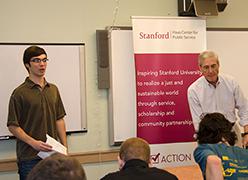Student Affairs
Student Reflection: Committing to Public Service

Kyle introduces former FBI Director Robert Mueller at a Stanford in Government event in fall 2013.
By Laura Monkman
Education and policy are two topics that have long interested Kyle Vandenberg, ’14. But combating educational inequities and partnering with communities are more than abstract principles to him. What he’s learned through public service at Stanford now shapes his whole outlook on life.
In high school, Vandenberg, a self-described “speech and debate nerd,” was already interested in public policy, politics and governance issues. At a public service fair during his freshman year, Vandenberg was naturally drawn to Stanford in Government (SIG), a student-led affiliate of the Haas Center for Public Service. He also discovered Music Enriching the Lives of Developing Youth (MELODY), a piano tutoring organization that has allowed him to combine his interests in music and public service.
As a freshman, Vandenberg became a tutor with MELODY, working with students at John Gill Elementary School in Redwood City. After becoming president of the organization in his sophomore year, he participated in the Public Service Leadership Program (PSLP), learning about the Haas Center’s Principles of Ethical and Effective Service. The principles define the Haas Center’s responsibility to communities and serve as a guide to students, faculty and staff involved with public service activities.
Vandenberg sees his decision to major in public policy as the logical outgrowth of his involvement with SIG and MELODY. He says that public service has done more than enrich his education in and outside of the classroom; it has become “a way of living” for him, not “something I do for an hour on Saturday mornings.”
One of the most important principles Vandenberg learned while leading MELODY was the idea of partnering rather than parachuting in—engaging with communities for long-term change rather than imposing change from the top down. To increase parental engagement, MELODY decided to publicly celebrate students’ successes more often by holding quarterly student recitals. In addition, tutors take a few minutes each week to talk with parents, making sure they are kept up-to-date on their children’s homework and practicing. Vandenberg says that more frequent parental contact in person and over email has increased active buy-in and helped the program to improve its effectiveness in key areas like attendance.
“Beyond my time as a Stanford undergrad, I hope to land in a place in the education field that I find to be fulfilling and a good match for my skills, and that allows me to improve the quality and equality of education for students in a deep way and on a broad scale,” says Vandenberg. “I’m not sure [which field this] will be in… but what I do know is that the support of the Haas Center has enabled me to arrive at this decision point, and what I have learned here will undoubtedly guide my work, wherever I end up.”
Vandenberg has participated in several other Haas Center programs, including Alternative Spring Break, where he spent a week focusing on the impact of inequality on youth in the juvenile justice system in the Bay Area. He has attended various Service Organization Leadership Program workshops, and still tutors with MELODY.
Vandenberg taught seventh grade writing, speech and debate with Breakthrough Collaborative in San Jose this past summer. He says that his commitment to public service was further cemented by seeing the daily perseverance, drive and motivation of his students to overcome obstacles. As a result, he says he feels that “truly effective service should be integrated into your life and complementing what you do outside of service—your family relationships, your work.”


